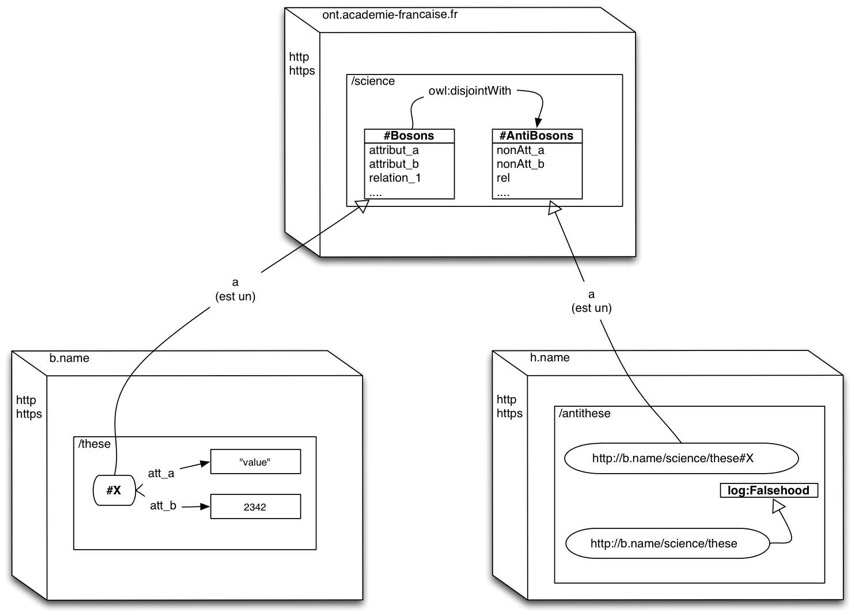- From: Delfí Ramírez <delfin@delfiramirez.info>
- Date: Sat, 20 Jun 2015 07:51:22 +0200
- To: Larry Masinter <masinter@adobe.com>
- Cc: henry.story@bblfish.net, public-philoweb@w3.org, Carvalho Melvin <melvincarvalho@gmail.com>
- Message-ID: <9d1c1040439d0657e81df2a3fd901f5c@correoweb.delfiramirez.info>
Hi all: I agree both with Larry & henry, except for my knowledge, and skepticism, on this modern French philosophers mentioned. Talking on the build of a semantic web that can be analogical in certain terms, to our mental model of the World, I would like to remark and to scope the need in a future, for a "MODEL OF TRUTHS" instead of a single "true" model, besides a single"truth model" works certainty in the realm of Applied Logic. Here comes in mind the subsets we know from the Set Theory and the relations ( binomial or polinomial ) between those subsets. Beliefs, as a LiebensForm, are needed for our representation of the web and its semantic scenario. Those beliefs, the ones that come from introspection and analysis, might not be "true" in the sense of truth as a Universal value. Regarding controversy, well, just comes also in mind the time we are living this life, not producing physically but dreaming, in fact sleeping. Relations of memories and facts whichmight seem true, in that brief moment of time. Have a nice week-end --- delfin@delfiramirez.info http://delfiramirez.info [7] skype username: segonquart [8] twitter:@delfinramirez common weblog: http://delfiramirez.blogspot.com [9] Directory of Experts in Information Handling [10] about: Technology Lover & good cook. place: Somewhere over Europe. My Digital Signature [11] On 19/06/2015 18:53, Larry Masinter wrote: > I find myself having to remind myself in these discussions that the task of discovering what is 'true' about the world is much more difficult, intractable, and philosophical than the question of designing a practical application of artificial intelligence called the "Semantic Web". > > If you move from asking "is X true?" to "do I believe X?" where every agent maintains its own level of belief, based in part on the agent's understanding of the meaning of terms and trust of the source. > > Then disagreement is modeled by different levels of belief. The model has to account for "well-established" and "prestigious" as terms of art as well.... the social aspects of establishing reputation and authority. > > I've been very influenced lately by Schneier's "Liars and Outliers" as a perspective that models trust. The "semantic web" protocol stack puts trust and context at the top; making them foundational helps with modeling controversy, ambiguity, and security. > > On 5/26/15, 9:58 PM, "henry.story@bblfish.net" <henry.story@bblfish.net> wrote: > >> On 27 May 2015, at 03:14, Larry Masinter <masinter@adobe.com> wrote: >> >> Missing reference, what is the distinction before "Form" and "forms"? >> But the Semantic Web is a web of utterances by distributed players which are all intrinsically ambiguous and highly likely to be full of contradictions and differences of opinion. >> The main 'invention' of the web (and Gopher before it) was the distributed authority of having uncoordinated but linked data resources. A semantic WEB needs the same freedom for different serves to make contradictory assertions... is that what you mean? > > I agree. > > What has not yet happened is specification of vocabulary for disagreement. Various philosophers in France, including Bernard Stiegler and Bruno Latour, have put a lot of emphasis lately on the importance of controversy. > > Even though a controversy could emerge from a pure logical contradiction such as the following example illustrated in the diagram below, where we imaging a well established ontology from a prestigious organisation that creates two disjoint categories of bosons and anti-bosons. Then we can imagine well respected scientists B that classifies an object as a Boson, and yet scientist H that then later classifies the > same object as an Anti-Boson. > > As he discovers this difference, H adds that the information on B's </thesis> resource is a falsehood. > This is neither a Like nor a Dislike. It's both in some sense, as controversies can be very fruitful. At the minimum it is a pointer to reasoning engines that they should not merge both graphs. > > As is well know in logic everything follows from a contradiction: i.e. no distinctions can be made. And indeed once a contradiction is reached everything can be questions. In this case the controversy could question: > > * the ontology > * the statement by any of the scientists, or the procedures they used to reach those statements ( where they referring to the same entity? ) * the logical engines that showed these two as contradictory > * ... > > A discussion on each side could bring to bear different points of views on the subject. At the end this could lead to a split of both communities, or a retraction of one of the three of some relation. > > Not all controversies need be logical based. Someone could publish a relation such as > > <http://dbpedia.org/resource/Muha [3]mmad> > <http://xmlns.com/foaf/0.1/depicti [4]on> > <https://eagereyes.org/media/2010/empty-frame.jpg [5]> . > > And that could in certain circles be controversial. > > Henry > >> Larry >> -- >> http://larry.masinter.net [1] >> >> http://masinter.blogspot.com/2014/11/ambiguity-semantic-web-speech-acts.html [2] >> >> On 5/26/15, 1:59 PM, "Melvin Carvalho" <melvincarvalho@gmail.com> wrote: >> >> I was reading this quote lately: >> >> In order for the Global Semantic System to be able to produce creative utterances, _it is necessary_ that it be self-contradictory and that no _Form_ of content exist, only _forms_ of content >> >> I was wondering if it applies also the semantic web and decentralization. > > Social Web Architect > http://bblfish.net/ [6] Links: ------ [1] http://larry.masinter.net [2] http://masinter.blogspot.com/2014/11/ambiguity-semantic-web-speech-acts.html [3] http://dbpedia.org/resource/Muha [4] http://xmlns.com/foaf/0.1/depicti [5] https://eagereyes.org/media/2010/empty-frame.jpg [6] http://bblfish.net/ [7] http://delfiramirez.info/ [8] skype:segonquart?call [9] http://delfiramirez.blogspot.com/ [10] http://www.directorioexit.info/ficha371 [11] http://delfiramirez.info/public/dr_public_key.asc
Attachments
- image/jpeg attachment: Controverse-scientifique.jpeg

Received on Saturday, 20 June 2015 05:51:50 UTC